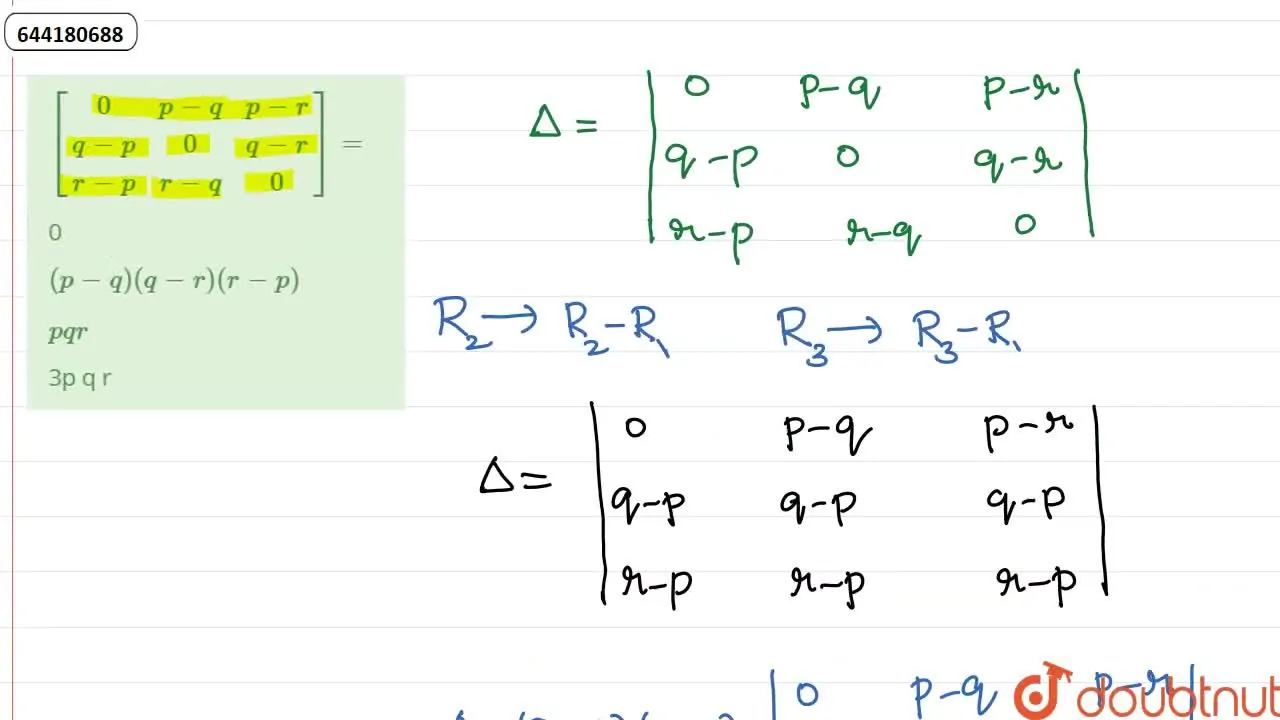⎡⎢⎣0p−qp−rq−p0q−rr−pr−q0⎤⎥⎦=Solution in Kannada
0
(p−q)(q−r)(r−p)
pqr
3p q r
The correct Answer is:A
Step by step video, text & image solution for [[ 0 , p-q , p-r ],[q-p , 0 , q-r],[ r-p , r-q , 0 ]] = by Maths experts to help you in doubts & scoring excellent marks in Class 12 exams.
Related Playlists
Similar Questions
Which of the following is not a proposition?
02:58View SolutionThe value of x for which 2x3−9x2+12x+2 is decreasing in
03:58View SolutionIf (x+2) is a common factor of (px^(2)+qx+r) and (qx^(2)+px+r) then a p=q or p+q+r=0 b p=r or p+q+r=0 c) q=r or p+q+r=0 d p=q=-(1)/(2)r
05:06View SolutionThe solution of equation (p+q-x)/(r)+(q+r-x)/(p)+(r+p-x)/(q)+(3x)/(p+q+r)=0 is
02:44View SolutionIf p, q, r are not in G.P. and ∣∣ ∣ ∣∣1qpα+qp1rpα+rqpα+qqα+r0∣∣ ∣ ∣∣=0 Show that pα2+2qα+r=0
06:17View SolutionThe lines (p-q)x+(q-r)y+(r-p)=0(q-r)x+(r-p)y+(p-q)=0,(x-p)x+(p-q)y+(q-r)=
02:56View SolutionIf the pth , qth and rth terms of an A.P. be P, Q and R respectively then show that,
p(Q−R)+q(R−P)+r(P−Q)=0.03:04View Solutionसारणिक के प्रगुण का प्रयोग कर दिखाइए :
∣∣ ∣ ∣∣0p−qp−rq−p0q−rr−pr−q0∣∣ ∣ ∣∣=004:16View Solutionसारणिक ∣∣ ∣ ∣∣0p−qp−rq−p0q−rr−pr−q0∣∣ ∣ ∣∣ का मान ज्ञात कीजिए |
04:00View SolutionSimply
(apaq)p+q−r.(aqar)q+r−p.(arap)r+p−q12:21View SolutionIf (x+2) is a common factor of (px2+qx+r) and (qx2+px+r) then (a) p=q or p+q+r=0 (b)p=r or p+q+r=0 (c) q=r or p+q+r=0 (d)p=q=−12r
04:03View Solutionरेखीय (p−q)x+(q−r)y+(r−p)=0
(q−r)x+(r−p)y+(p−q)=0
व (r−p)x+(p−q)y+(q−r)=0 है05:00View SolutionThe lines (p-q)x+(q-r)y+(r-p)=0(q-r)x+(r-p)y+(p-q)=0 (r-p)x+(p-q)y+(q-r)=0
06:51View Solutionसमीकरण p+q−xr+q+r−xp+r+p−xq+3xp+q+r=0 का हल है
04:07View SolutionLet p,q,r be distinct positive numbers. Three lines px+qy+r=0,qx+ry+p=0 and rx+py+q=0 are concurrent, if
06:08View SolutionIf (x+2) is a common factor of (px^2+qx+r) and (qx^2+px+r) then a) p=q or p+q+r=0 b) p=r or p+q+r=0 c) q=r or p+q+r=0 d) p=q=-1/2r
03:04View Solution


